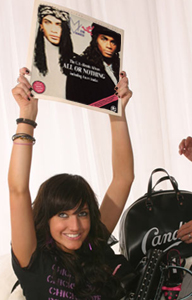 Rockers, Keep Your Day Jobs
Rockers, Keep Your Day Jobs(Business Week Online) To quote the sages of AC/DC, rock 'n' roll ain't noise pollution. And now it ain't that good a business, either.
In 2006 the mainstream rock act that reliably sells platinum, or 1 million copies, is an endangered species. Subtract those established in eras just past, such as U2 and Green Day, and the population shrinks further. This is a relief to savvy listeners -- thousands of independent-label flowers now bloom -- but it's hell on major record labels, which still need massive sales from franchise bands. Rockers favor albums over singles (famously, Led Zeppelin never released "Stairway to Heaven" as a single), and albums reap bigger profits for their labels. While rock helped build the big labels' superstructure in the 1960s and 1970s, now chunks are falling off that facade.
In recent weeks, New York and Philadelphia each lost their sole radio station devoted to "modern rock," the format most likely to play new rock bands for a mass audience, and Phoenix lost one of its two. This follows a year in which some seemingly sure-thing rock releases, specifically from Audioslave and the White Stripes, notched less than half their previous CDs' unit sales. These bands are hardly finished, but they show how achieving and maintaining rock superstardom is a different beast today.
ONCE IT WAS ALL MUCH EASIER. There was a simple symbiosis among rock radio, record labels, and the arena-concert circuit. In the 1970s their interplay enabled the emergence of a new class of megastar band like Led Zeppelin. But of nearly equal importance to the music business, it also gave rise to a cadre of second- and third-tier rock bands that, despite critics' complete derision, sold zillions of records. These days the names Grand Funk Railroad and Foghat are primarily punchlines, but in the '70s they scored a total of 17 gold or platinum albums. They were also big concert draws, stoking massive fan bases at the sleazy, smoky arena shows that were sort of spiritual, sort of Satanic. (N.B.: Grand Funk's records are better than you think.)
 This type of band no longer exists and neither do the conditions that fostered their ascent. Rock radio is increasingly a victim of fragmenting demographics. The sole genre posting sales gains last year, according to Nielsen SoundScan, was Latin. Arena rock shows that once promised spectacle for less than a sawbuck have bloated into elite affairs resembling closed corporate events. Average ticket price for a show on the Rolling Stones' 2005 tour: $134. It's no surprise, then, that the arena-concert business has shifted decisively toward greatest-hits revues by graybeards such as the Stones and the Eagles.
This type of band no longer exists and neither do the conditions that fostered their ascent. Rock radio is increasingly a victim of fragmenting demographics. The sole genre posting sales gains last year, according to Nielsen SoundScan, was Latin. Arena rock shows that once promised spectacle for less than a sawbuck have bloated into elite affairs resembling closed corporate events. Average ticket price for a show on the Rolling Stones' 2005 tour: $134. It's no surprise, then, that the arena-concert business has shifted decisively toward greatest-hits revues by graybeards such as the Stones and the Eagles.Today's key entry points for music consumers are iTunes (AAPL ) and ringtones. The former favors singles over albums and thus further unbundles rockers' preferred medium, and the latter is peculiarly inhospitable. None of the top 10 ringtone downloads of 2005 came from rock acts. Hip-hop now owns the artist-as-icon phenomenon. Rock hasn't minted a star with the pop-cultural legs of 50 Cent or Eminem in this century.
 There are benefits to the splintering of musical hegemony. Broader access to music, be it from online recommendation engines or satellite radio, gives consumers many more choices than they had in the old days. One big story of 2005 was the wildfire success of Clap Your Hands Say Yeah, which parlayed blog buzz into selling something like 50,000 copies of a self-released CD and an appearance on Late Night with Conan O'Brien.
There are benefits to the splintering of musical hegemony. Broader access to music, be it from online recommendation engines or satellite radio, gives consumers many more choices than they had in the old days. One big story of 2005 was the wildfire success of Clap Your Hands Say Yeah, which parlayed blog buzz into selling something like 50,000 copies of a self-released CD and an appearance on Late Night with Conan O'Brien.Some newish rock bands have established themselves as franchises reminiscent of another era. (Coldplay leaves the cognoscenti, ah, cold, but its sales make Capitol Records happy.) Still, the big business plays for today's bands are complex revenue-sharing deals that monetize everything down to T-shirt sales, as Korn did in pacts with EMI Group PLC and concert promoter Live Nation Inc. (LYV ) Once it was much easier. And so somewhere the thinning bangs of a music exec hang limp as he quietly sobs at his desk, overwhelmed by a sudden nostalgia. Who'd have thunk he'd miss Grand Funk this much?
This Supersuckers song, "Rock n Roll Records (Ain't Selling This Year)" should be played in the background while reading that article


I'm an old rocker (almost 49) so I've seen the whole thing unravel over the years. I will admit I miss the day when rock dominated the charts but on the other hand there is an amazing supply of creative young bands out there these days. There's one listener-supported station in Seattle that plays great new stuff and if I listen for an hour I almost always stumble upon something that arouses my curiousity and sends me to the cd store.
ReplyDeleteWho knows..maybe the struggle is good for rock.
I tend to agree with you. I'm not that sad that the major labels can't seem to get any sales in rock. They barely even try. Look at the crap they choose to promote.
ReplyDeleteSince I'm a big underground rock guy, I like what's going on. It reminds me of the early 80s. Everything good was underground, and the only "rock" acts that sold records were older artists from the 70s. I hope we get a decade of underground rock as good as the 80s this decade.
i have to as a 21 yr old music buff, the commercial failure tt happ to mainstream rockmusic is one of the best things tt happ to me..then again failure mite b a harsh term..there r a big bunch of posers n pop punk bands tt make money under the general categorizatn of rock..but rock in terms of attitude and sentiment is well n truly dead..in the mainstream anywy..but wt the onslaught of sickieningly nu bands like linkin park did is tht it mdae me go bk in time..ive discovered some of the best music evr in the last 3 yrs n most of it is early 90s, and the 60s, some 70s..somethng id nevr hav discovered if good music was being made currently..this is an experience common to a lot of rock fans my age n its done us good..its the awakening of a new genration of rock fans wt old school values n musical ethics..mebe there will b a resurrection of actual rock n roll..till then backstreet n nsync can make thier petty money n rot in mediocrity hell..
ReplyDeleteHoward, you couldn't be more right. This veyr thing is happening in Canada right now. All of the creative, innovative bands here are all on independent labels. A large reason for it is because all of the majors are owned by American companies, who don't want to or don't want to bother promoting 'different' Canadian music. All they want is to find the next Aviril or Nickelback. Meanwhile, great bands like Death From Above 1979 and Arcade Fire have to go the independent road. Which in the end is probably better, because they have much more control over their music. But still, the majors are totally missing the boat on the music industry here in Canada.
ReplyDeleteThe independent road is always where the best music begins. The trick is to make sure there is a way that independent bands can make a living outside of the traditional music business paradigm. Money does matter -- especially when you have none. People need to be willing to go out to a small, smoky, club on a Tuesday to support an upcoming touring band. They need to spend some dough on a CD or a shirt, and do what you can to promote the show -- even if you have no financial interest in it.
ReplyDeleteIf enough bands can survive (and thrive) without needing the trappings (and false promises) of the corporate music business, then we'll really be getting somewhere!